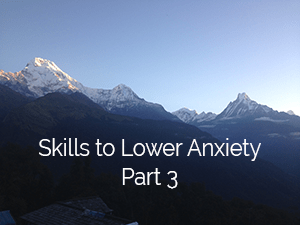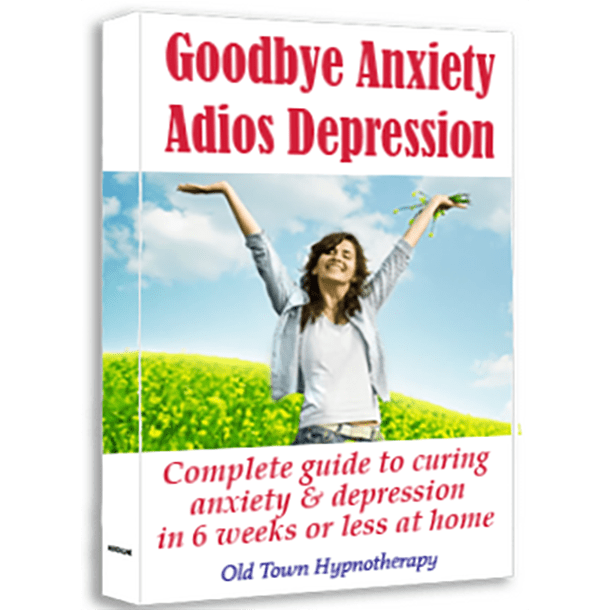Comfort with Ambiguity
In planning this three part series on skills to lower anxiety I did consider putting comfort with ambiguity as number one as just about everyone with anxiety struggles with this one.
What I mean by ambiguity is ‘not knowing’. Humans in general are terrible at being OK with not knowing, it genuinely does cause anxiety for most people at some time or others but the difference between those who deal with it and those who develop anxiety disorders is their attitude towards the unknown.
Acceptance that you don’t know is a skills worth practicing because if you can become aware consciously that you don’t know and be comfortable with that, your mind can relax and remain in the rational, intellectual part of your brain.
However, when you let go of the fact you simply don’t know, your imagination starts wandering.
If you are an optimist and your imagination works in a positive way, then it’s not necessarily a problem, you will just get disappointed from time to time when things don’t go the way you’ve imagined, but then, if you’re an optimist you will be able to handle that.
But, if you use your imagination in a negative way, you can create further problems for yourself that may develop into serious anxiety disorders such as OCD, IBS, headaches and migraines, anger, skin conditions, nervous system conditions and not least relationship problems.
Your brain doesn’t know the difference between imagination and reality. It’s your brain, it only knows what you tell it, aka thinking, and when you think in a negative way it interprets that negativity as danger, emergency or crisis. The more you negatively forecast the future the higher your anxiety levels become until eventually other emotional, mental or physical conditions develop as a reaction to the prolonged periods of perceived crisis.
Something we need to be particularly mindful of is the delusion that we can read other people’s minds – we know we are not telepathic (mostly), so why do we insist that we know what someone else is thinking?
This can cause many problems especially in personal relationships and relationships at work or with a friendship group.
I think this is exacerbated with the rapid increase in use of technology for communication. It is so easy to misinterpret the context of a message or the emotion behind it, largely because of the absence of body language and tone of voice. Over 70% of our communication is non verbal; we are very adept at unconsciously reading each other’s non verbal language, such as body language, tone of voice and micro expressions, but these elements are not present in technology.
Can you relate these examples:
- You receive a thoughtlessly worded email from a work colleague that comes across as insulting or you take it as a personal attack.
- You receive a text from a loved one that sounds abrupt and it upsets you.
Within seconds you’ve decided what they meant by that and it’s not very nice, so you react defensively and reply appropriately?
Or
- You haven’t heard from a friend or loved one when expected or within the timeframe you decide is appropriate and you either start to worry about them or get annoyed they haven’t replied.
- Even worse are applications like Whatsapp where you can see that someone has read your message, but they haven’t replied so you go through possible reasons in your mind why not.
These are cases of delusional mind reading.
If you had been with that person and they said exactly the same thing, it would be unlikely that you react in the same negative way because you would have the complete spectrum of communication to decipher the correct intended message.
A golden rule to remember is ‘do not answer if you are feeling a negative emotion about a message or a situation’; wait until you are back in your ‘right mind’ and thinking rationally before you do – in other words ‘sleep on it’
Sadly, these days our human discomfort with ambiguity can keep us locked in unhappy situations or prevent you from making the changes you need to in order to move forwards or make progress. Negative forecasting of the future not only creates anxiety but imagines situations that are the worst possible scenario so people stick with what they know. There are sayings such as ‘better the devil you know’ Why? I have to ask, how do you know that the alternative will be worse? Simply speaking, you don’t know.
The secret is to become comfortable with ambiguity, accept that you don’t know everything, that you can’t know everything before you set off on a journey.
Suppose you are going to visit a friend the other side of the country, a journey you’ve never done before; do you know the way, can you visualize exactly where you are going, knowing every turn you have to take? No of course you don’t if you haven’t been before. So how do you complete the journey successfully if you don’t know?
You might seek help from a map or you might look it up on the internet or ask someone and get advice about the best way. You take the journey one step at a time; you get to a cross roads, look at the signposts and take the road you need.
The same is true of life and of starting anything new. You can’t possibly know every step and everything about where making a decision might take you, but you can navigate life one step at a time, taking advice when you’re not sure, seeking out information or knowledge from other sources when you need help or would like to know your options at that point on the way.
You take the steps, you learn and you grow.
Staying still because you are afraid of what might happen, that fear born out of your over active imagination negatively forecasting the future doesn’t make rational sense, but it’s how many people behave.
I like to look at things that I know I need to do, but not looking forward to (negatively forecasting) as going through a tunnel. It might be a bit dark in there and I might not always be able to see the way forwards, but I know I will get to the other side of the tunnel and the reason I’m starting the journey is because I know the other side will be better that the situation right now.
Learn to be consciously comfortable with not knowing everything. Be aware that it’s not rationally possible to know or be able to predict the future or other people. It’s OK.
Sometimes things will go wrong life is like that, it’s never perfect all the time and trying to control or predict the future so it is perfect will have the result of holding you back from what you are really capable of.
You are far more capable than you think you are, the secret is to trust in your intuition and not listen to the negative part of your brain that hijacks your imagination to think up the worst possible scenario.
How you learn to do this is by looking after your own needs first, as a priority.
Positive Activity
Positive Interaction
Positive Thinking
Three practices that invoke the intellectual part of your brain that makes decisions rationally and not based on fear.
To learn more about how you can practice these things and learn to let go of anxiety, click the links below for the 7 Day Crash Course or Goodbye Anxiety, Adios Depression.

The 7 day video crash course is for people who are suffering from anxiety and/or depression and experiencing symptoms for example: anger, insomnia & sleep disorders, panic attacks, OCD, IBS, eating disorders,addictions or migraine and headaches, who want to learn the truth behind their conditions and learn what they need to do to be ‘normal’ again.
This 6 Week Intensive Hypnotherapy and Coaching Course is for people suffering fromstress, anxiety and/or depression and experiencing symptoms such as anger, insomnia, panic attacks, OCD, IBS, eating disorders, addictions, migraine and headaches.
…who are sick and tired of feeling sick, anxious and tired and
have decided to take control of their life and learn how to resolve issues and move forwards.
Disclaimer | Privacy Policy | Terms and Conditions
Copyright © OLD TOWN HYPNOTHERAPY 2016 All Rights Reserved



